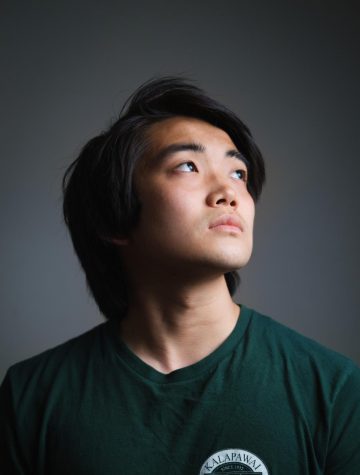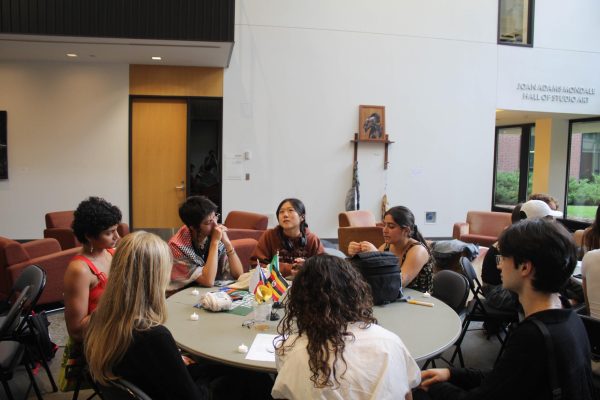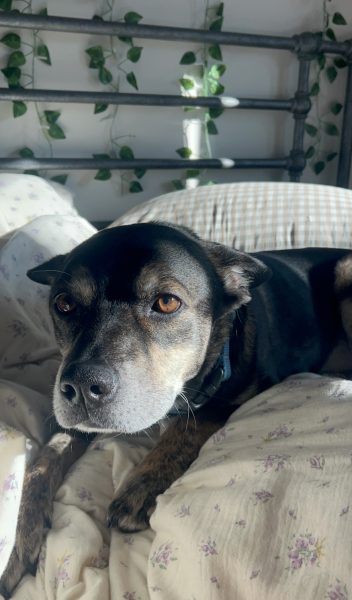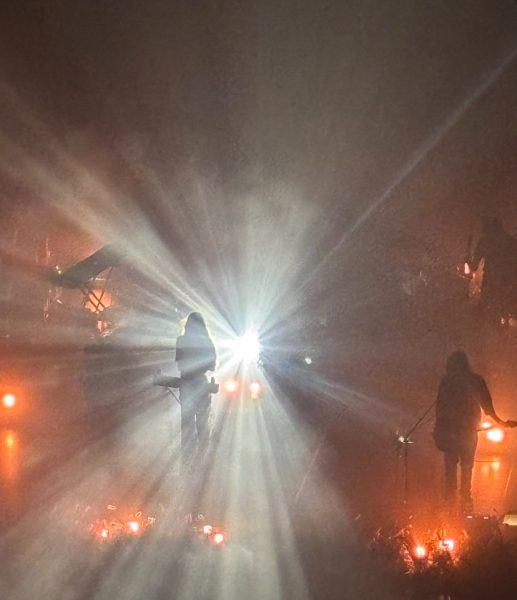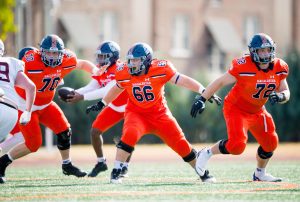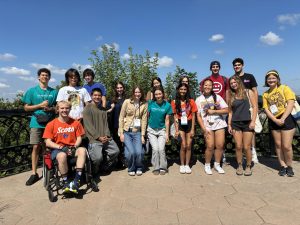A Final Interview with Brian Rosenberg
May 10, 2020
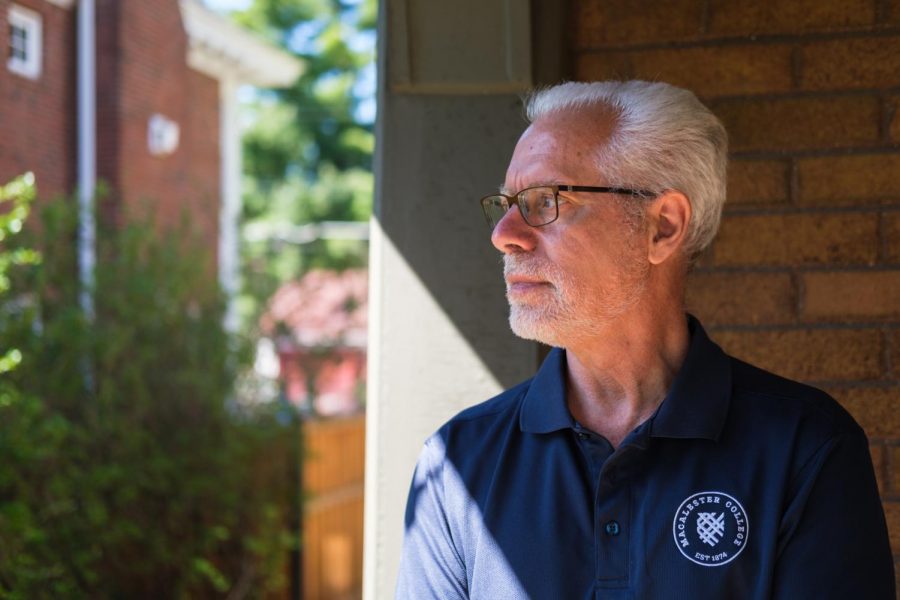
[powerpress]
For 17 years, he’s been the president of Macalester. This year, he’s stepping down. A final interview with Brian Rosenberg.
Guests: Brian Rosenberg, President of Macalester College
Further reading:
- Controversial party reviewed by College Harassment Committee
- Green Sheikh appearance cancelled amid protests
- Macalester campus unites for walk-in against hate
- Board says no new fossil fuel investments in victory for student activists
- Six years later, Neill’s name stripped from Humanities Building
TRANSCRIPT:
BRIAN ROSENBERG: I’ve always been struck by the fact that this is a community that takes things seriously, but it doesn’t take itself too seriously
(SOUNDBITE OF AUDIO: PRESIDENTS’ DAY VIDEO)
ROSENBERG: I filmed the president’s day video in 2010. I don’t know if you’ve seen it, but it’s really out of the box and it kind of makes fun of me and makes fun of college presidents. And I thought most colleges wouldn’t do this. Most colleges wouldn’t have the nerve to do this. But I love the fact this is a college that’s perfectly willing to make fun of itself and have the president make fun of himself.
You know, a lot of colleges, particularly places like Macalester, selective liberal arts colleges, they take themselves so damn seriously. And, and I sent my sons to a couple of those and I thought, man, I’d way rather be at Macalester because we just don’t do that.
GROVELAND THEME MUSIC
KORI SUZUKI, HOST: For 17 years, he’s been the president of Macalester College. This year, he’s stepping down. A final interview with Brian Rosenberg.
I’m Kori Suzuki. And from The Mac Weekly, this is Groveland.
THEME MUSIC ENDS
HOST: By the way, we’ll be covering a lot of ground in this interview. Some really big events in Macalester’s history. If you’re looking for some context, we’ll link to our articles about them in the episode notes.
ROSENBERG: I’m not an extroverted person, but this level of social distancing is tough. I just find that I miss people, you know, there are a lot of people at Macalester that I really like, and it’s not the same seeing their face during a zoom meeting. But I’m also aware of that compared to a lot of people. I’m very lucky. And so I try to put my own challenges in context. You know, I’m safe and I’m fed and I have all the basic things that make you secure and no one in my family is sick. So I try to be grateful for all those things. But it’s a lonely, stressful time like it is for everybody.
HOST: Well, if I can, I’d like to ask you to maybe take me back to a slightly less stressful, difficult time. And tell me about the Brian Rosenberg who first came to Macalester. Take me back to August of… 2003, right?
ROSENBERG: 2003. Yeah.
MUSIC IN
ROSENBERG: On the day that I was announced as president, it was a beautiful day. It was late May when they did the public announcement. And then I did sort of a meet and greet out on Bateman Plaza in front of the campus center and people could just come up and say hello.
At that point I had spent 15 of my life as an english professor and then I had spent five years as the Dean of the faculty at Lawrence University. So I still thought of myself, I think mostly as an academic, as a faculty member and it was just beginning, I think, to really process the fact that I was now an administrator. I felt like I was ready for a job like this, but I was also on a certain level scared out of my mind. You know, you don’t really know what it’s like to be a college president until you start doing it.
MUSIC OUT
ROSENBERG: And I just remember one of the first people to come up with Sedric McClure and we just had this great conversation. And he was just so friendly and welcoming. And he treated me like a person, not like the college president.
HOST: And what in those first couple months or first year as first semester, what was the picture that you started to get of Macalester? I’d imagine the Macalester that the college was back then was very different.
ROSENBERG: Yeah, there were some ways it was different. There were some ways it was the same. It was a place where there was a lot of questioning authority.
There’s a, there’s a button that the class of, I think it was 1978 had made up at one point, I think during one of their reunions. And it just said question authority on it. And that just kind of felt like Macalester to me. And it was, it was more true at Macalester than either of the places I’d been before. I had taught at Allegheny College in Pennsylvania and then I was at Lawrence and Macalester was a very different culture. It’s a much more progressive culture. And it is a much more critical culture, not in the sense of negative, but critical in the sense of, of analyzing and asking critical questions about things. So decisions that can be made in one way at a certain college probably wouldn’t work at Macalester. And levels of transparency that could get by at certain colleges just were not going to work here.
So Macalester is, you know, it’s the same way now I think, you know, it’s a, it’s a place where people ask a lot of hard questions, uh, and uh, for a call. And on the one hand that makes for real challenges when you’re in a leadership position, but it also kind of keeps you, you have to be on the top of your game at all times. You know, you can’t, you can’t be lazy. I learned you have to be honest with people here and you have to be pretty transparent as transparent as you can reasonably be.
HOST: I wonder, do you think Macalester as a community has changed the way you think about things, about the world?
ROSENBERG: Completely, yeah. I mean, first of all, just the, the experience of being, uh, in a leadership position is incredibly humbling. It should be. We probably both know some people for whom it’s not. But I have a much deeper sense of my own imperfections than I did when I started just because, you know, everything you do is so visible and consequential and you know, it just, it teaches you to, to be more humble, it should, and to be more empathetic. So I think that it’s changed me as a person pretty dramatically in that way.
MUSIC IN
ROSENBERG: But you know, a few things in particular. First of all, the opportunity to interact with so many international students has been just remarkably educational for me. And again, not just in an intellectual way but in an emotional way and has broadened my sense of just about everything and I hope made me a more empathetic person.
MUSIC OUT
ROSENBERG: I’ve talked about this before, but I do, I confess I have a particular soft spot for first generation students. The honoring the journey ceremony every year is the one that just gets me the most. And there are a lot of reasons but one is just I met my wife during freshman orientation in college and my father went to college, but she was a first generation student and just that little difference between having one parent who was college educated and coming, in Carol’s case from a working class family, very few people went to college. Certainly very few women went to college. She was just an exception in her family and it was a real struggle, not intellectually, she was really smart, but just the emotional burden of knowing your family was paying all that money and you’re away from home and your parents didn’t want, really want you to be away. The pressure she was under was very different from what I felt.
MUSIC FADES IN
ROSENBERG: And it was like, it took me many, many years and, and talking to so many first generation students at Macalester to actually understand what she was going through at that time.
MUSIC FADES OUT
ROSENBERG: And I mean, there’d been so much in the last five or six years. It just made me realize how indelibly the question of race is written on American history and on the American present. And you know, if you, if you grow up in a relatively homogeneous area. And I did, you know, there’s not a lot of, certainly not a racial diversity, a lot of racial diversity in the part of Long Island where I spent most of my childhood. And so I, I just don’t think that I was as attuned to the fact that race is just the defining feature of American history. And just how challenging it was if you are not part of the majority culture in this country until I came to Macalester and, and kind of lived it through students who I knew.
And so you know, for me that’s really been pretty powerful. When I think about the way I want to spend my time after I leave, know I want to, I’d love to continue working on higher education issues and I really want to be focused on these issues related to equity, whether it’s economic or racial just because they are just so important. And I don’t know that I had that since before I, in fact, I know I didn’t have that sense before I had my years at Macalester.
MUSIC FADES IN
HOST: What’s your least favorite thing about Macalester?
ROSENBERG: That’s a really good question. And I have actually thought about it a lot. And, whenever I’m asked, I typically give this answer.
MUSIC FADES OUT
ROSENBERG: You know, Macalester is a place where, on a lot of issues, there’s a pretty strong community consensus. You know, we tend to lean pretty strongly in a progressive direction, which is fine. But I also think learning takes place best when people exchange ideas with people who don’t agree with them. And I sometimes feel as if at Macalester, students, in particular , who want to express a view that might not be the predominant view feel silenced. And, and I’m not only talking about students who would self-identify as conservative. I mean there are some of them, there aren’t a lot, but there are some, but I’ve even heard from students who would self identify as moderate or pretty liberal that they might disagree with the consensus on a particular issue, but they’re worried about saying anything because they don’t want to get slammed.
I don’t know if you remember last year, it did make the Mac Weekly, but there was a speaker who was going to be brought in by the, the political science student organization. And he was, I don’t remember his actual name, but he was referred to as the Green Sheik. And he was a member of one of the royal families in the UAE where there are in fact a lot of abuses and problems and human rights violations. But this particular person had spent about 20 years with a real commitment to environmental justice.
And so they wanted to bring him in to talk about how and why someone who’s part of a ruling family in an oil producing region would get committed to environmental justice. And there were, there were some other students on campus who basically said, we think you’re legitimizing him and you’re legitimizing the UAE by even bringing him here. So if he comes, we’re going to shut him down. And there were threats of throwing shoes and doing other things. And what finally had ended up happening was he just withdrew. And I think it was a really disturbing experience for the students who tried to organize it. I think at the end of the day they just decided, this isn’t worth it. You know, we don’t, we don’t want to be in the middle of a, of a violent controversy or something that involves throwing objects. And I thought that was unfortunate. I mean, their argument was let them come and speak and then ask them really hard questions about the UAE. I mean, as opposed to shutting them down.
HOST: Hmm. Do you think that’s something that’s unique to Macalester especially? Because I know right now, especially that’s happened a lot on other college campuses like Middlebury and UC Berkeley.
ROSENBERG: Yeah, no, it’s not unique to Macalester at all. And in fact, I think in some ways Macalester hasn’t been as problematic as some other campuses. That was the one instance I can think of where it actually happened at Macalester, but in general, we haven’t had a lot of instances like that. But to be fair, we haven’t brought in a lot of speakers who would provoke that kind of reaction.
And I wish that didn’t happen. Obviously you have to establish boundaries, you know, things that are offensive. We can establish community standards that say that’s not okay. But things that are simply a minority opinion, if not expressed in a way that’s offensive, those things should be okay. And we should be able to say to those people, you know, I disagree with you and here’s why. As opposed to how outrageous that you even expressed that opinion.
And if there’s one thing I could change about Macalester, it would be to have everyone on campus who has a reasonable view to express, even if it’s not a popular view or a majority view, would feel comfortable expressing it—expecting pushback and debate, but not expecting to be silenced. And it’s actually something that a lot of students have talked to me about over the years, and I don’t, I wish I had an easy answer for how to change that. Because cultural change is the hardest kind of change to make. But that’s the thing that I, that’s the thing that I think we probably do least well, is tolerate that wider diversity of opinions.
HOST: Is that something you’ve seen change in intensity or how it takes place at the college over your time or is it something that’s remained consistent? I can really only speak for my time here, but it seems like the last three years have been exceptionally eventful.
ROSENBERG: There’s never really been a period where there haven’t been eventful things that sometimes are controversial or inflammatory. Sometimes they’re deeply painful to the community. You know, the things that have been most difficult for me personally have been the fact that we’ve, we’ve lost three students in the last several years, you know, to either suicide or drug related incidents. And that’s, you know, that’s just devastating. And we’ve had more of that in the last few years than in the ten years before that.
And then there are, I’m trying to remember the exact year, I won’t, but, at some point, maybe eight or nine years ago, there was a series of sort of politically incorrect parties at college campuses across the country. And there was one at Macalester. It was an off campus party, but some students who attended it dressed up in costumes that were really offensive and they managed to be offensive to a lot of different groups. And it was a big deal. In fact, it made the national news. In some ways I think it was because it was at a place like Macalester. So it was in USA Today. Uh, the local media all covered it. We had a large community gathering in the chapel that was pretty intense. Uh, so things like that have always happened.
I do agree that it feels like the last three or four years have been particularly challenging. There, there are aspects of that that are, that are bad. And then there are aspects of that that I actually think are pretty good. You know, the, the bad part is that you have seen, you know, and I’ll just be very direct. I mean, I think you’ve seen since the election of Trump, a kind of empowering of some really extreme voices. And you know that we’re not immune from that. You know, we, whether we still don’t know where the, like the swastika, cause we don’t know where they originated. Uh, we can’t discount the possibility that was someone in our own community. We can’t discount the possibility that there were people outside our community involved. But either way, it just seems like that kind of expression of hate has been validated in a way in the last three or four years that I have never seen before. So that’s the really bad part.
You know, the better part are things like the walk in or the sit in, you know, the Fossil Free Mac sit-in. I’d be the first to admit that I just hadn’t done the kind of research into Edward Duffield Neill that the students did. And that I hadn’t paid sufficient attention to signals that there’s more to this guy then the typical Minnesota history would suggest. And student organizations that had been working on it for a while, they’re the ones who brought, brought a lot of that information.
And what really is noteworthy about those events in particular is how thoughtful they were. You know, it’s one thing to just issue a list of demands or protest or you know, even do violent things. But that hasn’t been the Macalester way. I mean, both of those events, the walk in and then the Fossil Free Mac sit-in were exceptionally thoughtful and we’re not designed to push people apart, but to bring people together.
MUSIC IN
ROSENBERG: I think, I think students have gotten, at least at Macalester, much more strategic and smarter about trying to go about and effect institutional change.
You know, if you get, if you’re going to affect change, you need to understand the systems you’re trying to change. You need to understand who is going to be your, who can be a partner with you. Who is persuadable, what do we need to do to change people’s minds as opposed to just shouting at them or telling them they’re wrong.
And you know, a lot of the student activists in Macalester have been just super smart about all of this. And you know, they’ve had an impact, you know, whether it’s, you know, doing much, much better training for faculty in particular, but faculty and staff around creating inclusive spaces in classrooms to the changes that the Board of Trustees made and our investment policies. I mean these are things that were totally student driven and will make a difference at the college for a long time.
MUSIC OUT
ROSENBERG: When I look back on my time at Macalester, the Fossil Free Mac sit-in is one of the things I’m always going to remember. It was really extraordinary to have, you know, probably a hundred students sit there for several hours basically in silence, you know, and just wait. And I actually think the power of that silence was exceptionally strong and was felt by the people in the room. Uh, and everyone I’ve talked to, every Trustee I’ve talked to, every staff member I’ve talked to who witnessed that felt the same way that this, this is really amazing.
MUSIC IN
HOST: I’m wondering if you feel, like looking back on your time here, there are things that you wish you could have stayed longer to do.
ROSENBERG: You know, I wish, and I know this will continue, but you know, I’ve gotten so focused in the last few years on issues of, of equity and inclusion and I feel like I’ve only started to work on that in the way that I want to. And you know, if I had more time I would, I would work on it more, but I’m also confident that that will continue. You know, I think that’s a priority of Dr. Rivera’s and I know that it’s a priority of a lot of people at Macalester to make sure that every student who enters this place has the same opportunity to thrive. So I’m glad that we have made some progress and I really think we have, you know, if I were, if I were staying longer, I think a lot of my attention would be focused on that question.
HOST: How do you think you will be remembered by Macalester students, by the Macalester community, as someone who is here in such a big part of the community for so long?
MUSIC OUT
ROSENBERG: You know, I really don’t know Kori. I mean it’s, you know, that’s, I think it’s one of the things about a college presidency is that it’s really hard to judge its impact in the moment because so much of what you do as a college president, if you’re really doing your job, is about the future.
I use the example often of John B. Davis who was president from the mid seventies to the mid eighties. And if you just looked at Macalester during that period, it was really struggling. You know, they were big financial problems. The size of the student body was going straight down. It was, it was really tough.
But he had inherited a really problematic situation and what he did was lift the spirits of the community and restore people’s faith in the college. Now, the benefits of that really didn’t come until after he was gone after John was no longer president. But if you look back now with, uh, with the perspective of several decades, you could see that’s really where he turned things around.
MUSIC IN
ROSENBERG: In some ways it’s like any figure in any history, you know, you kind of have to wait and, and take a historical view. I’ll be long gone when people are trying to figure out what, what difference the, you know, my presidency made from Macalester.
You know what do I hope? I feel pretty intensely that I’m extraordinarily privileged to be in the position that I’m in, but I also feel the weight of it on me every day. I do on a certain level, feel directly responsible for, you know, the wellbeing of 2000 students and 600 employees. I probably do this to a fault, but I take it very personally, you know, if something gets screwed up or someone gets hurt or something happens, I really feel like somehow I didn’t do what I’m supposed to do.
ROSENBERG: It’s the same thing I said when I started. My very first faculty meeting in 2003, I said, you know, I can only promise you a couple of things. You know, I can promise you that I’m going to tell you the truth. And I promise you that every time I make a decision, it will be one that I think is in the best interest of Macalester. You’re not always gonna agree with me. In fact, I can pretty much guarantee that everyone’s going to disagree with me at some point. But hopefully I can establish faith that I, and I’m telling you the truth and that I’m not making decisions for some hidden reason, but because I think it’s in the best interest of Macalester.
MUSIC OUT
ROSENBERG: You know, a lot of what I feel right now is, is just sadness at leaving Macalester in such a bizarre way. This is not how I anticipated it was going to happen. And anyone who knows me well would tell you this: I hate being the center of attention. And I was not someone who felt like I needed all kinds of big send offs or parties, but not being able to say goodbye to the people who I care about in a more personal way than on a screen, that’s tough. That’s really tough when you know, you’ve known a lot of these… You know, just take Sedric, you know, we just had a zoom call yesterday about something or two days ago. But, you know, I always imagined that the last thing I would do with Sedric McClure was give him a hug. And I can’t do it. And that really stinks. So this is, you know, it’s a particularly challenging time to have to be distant from people when you’re saying goodbye to them.
HOST: What are your hopes for Macalester going forward after you leave for the community? For the students, for the administration? What do you hope to see?
ROSENBERG: You know, my, my goal is I want Macalester to be in every way better 10 years from now than it is now, you know, just to continue to get better and better. And I don’t define, I don’t define that in terms of, you know, SAT scores of incoming students. In fact, I’m hoping that one of the effects of this will be to kill the whole standardized testing world. When I say better, I mean in, in different ways.
You know, I think we’ve made progress on both the diversity of campus and the inclusivity of campus, but we’re not where we need to be. Where I would love to see Macalester in 10 years is a kind of model of a place where pretty much every student feels, you know, this is a school where I’ve been given the same opportunity to learn as it is everyone else in my class or everyone else in my residence hall and where the student body, to the extent possible. is a reflection of the world we live in and not some, more homogeneous subset of that world.
HOST: What do you think is the future of liberal arts colleges? I mean, I think that would have been a question before the coronavirus, but especially now.
ROSENBERG: Higher ed is going to go through a very rough stretch. There was an article that I just read yesterday in Forbes, which did an analysis and said that if every industry, the one that’s probably going to be hit hardest by this is higher education, even worse than the hospitality industry. And, and the reason is that, you know, a traditional college campus is about the hardest place to practice social distancing that there is.
There are some workplaces where people are already talking about beginning to start up by doing things like alternating who comes in on what days. So for two weeks you have half of your workforce come in and then the next two weeks you have the other half. And that way you, you maintain more social distance between people.
You know, when you have a college campus with a very fixed physical plan and lots of students crowded together and they’re in residence halls and classrooms and dining halls, it’s almost impossible to practice any kind of real social distancing. And so the road from where we are now, back to normal, whatever normal looks like, that’s going to be a bumpy one for colleges. And figuring out how to get there. and then for a lot of college, just figuring out how to survive, you know, the finances, it’s going to be a major challenge. And I do think, you know, absent some major federal support, you’re probably gonna see a lot of colleges close.
The silver lining, and I always try to look for them is that, my sense is that this period of online learning and of isolation, has made a lot of people appreciate more how wonderful it is to actually be on a campus and have direct interaction with your professors and with staff members and with other students. And so I think it’s another case where the absence of something makes you realize just how important it is. So I think people may come back to these campuses with a deeper appreciation for their value and, and an understanding that they can’t easily be replicated on Zoom. Uh, so, you know, I think people might realize that there’s something here worth saving and it may be hard to save it. We may need to make changes to save it, but at the core of the liberal arts college experience is something that is irreplaceable and hard to replicate and worth fighting to save.
HOST: Well, I know as president you can address the Macalester community at any time, but I’m wondering if there’s anything that you would want to leave with students, faculty, staff in a setting where it’s a little more conversational. Less of a state of the nation, of just, just two people talking.
(ROSENBERG LAUGHS)
ROSENBERG: Macalester is not a perfect place. But no place is. And my experience, as someone who’s dealt with probably more of Macalester alumni than anyone on the planet, is that sometimes people don’t appreciate just how remarkable Macalester is until they’re gone, you know, until they’ve moved into different parts of their lives and they look back and they realize, wow, that place was really pretty special. I’ve never lived in a community like that, never been in a place like that since I left.
And I, I just so desperately want people to understand how powerful the idea of Macalester is and how distinctive and important it is as a place. It’s great to realize it when you’re gone, but it, it’s sometimes also important to make sure you realize that when you’re there—that in this little 60 acre piece of Saint Paul, you’ve got people from 90-something different countries and from every state, and from all these different backgrounds. And you bring them all together and you try to do this incredibly difficult work of building community. And we don’t always succeed. But based on what I’ve seen, we do a remarkably good job compared to most other places in the world.
So even as we challenge and criticize it, I think it’s really important that people appreciate it and take care of it. Challenge it, criticize it, but also appreciate it because it’s a pretty remarkable place.
MUSIC IN
ROSENBERG: I’m glad you finally got around to talking to me after all this time. I was feeling neglected, but you’ve made up for it, so I forgive you.
HOST: Sorry it’s taken so long.
ROSENBERG: No, that’s okay. I’m glad we were able to do it.
HOST: President Rosenberg, thank you so much for taking the time.
ROSENBERG: Thank you Kori. It’s been my pleasure and good luck yourself working your way through this. This will end and you will be able to do all kinds of wonderful things once this is over.
HOST: Brian Rosenberg is the 16th president of Macalester. In the fall, he’s moving to Cambridge to work with Harvard’s Graduate School of Education. President Rosenberg will give his final address to the college online, at the Commencement ceremony on May 16th.
MUSIC FADES OUT
GROVELAND THEME MUSIC
This episode of Groveland was produced and edited by me, Kori Suzuki. Our editors in chief are Hannah Catlin and Morgan Doherty. Our theme music is by the Blue Dot Sessions. If you have thoughts on this episode, we’d love to hear them. You can reach our audio team by emailing me at “K suzuki one at macalester dot E D U”.
Groveland is a production of The Mac Weekly, Macalester’s independent student newspaper. For more news like this, follow us on Facebook, Instagram and Twitter at “The Mac Weekly”, and visit us online at “themacweekly dot com”.
For the first time, The Mac Weekly is going to keep working over the summer so that we can keep you up to date during this crisis. And that means Groveland will be back soon. Stay tuned. I’m Kori Suzuki. Thanks for listening, and see you next time.
THEME ENDS

